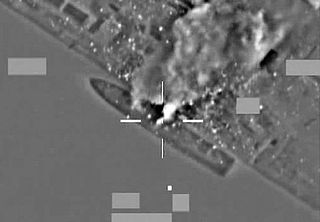 W
WOn 19 March 2011, a multi-state NATO-led coalition began a military intervention in Libya, to implement United Nations Security Council Resolution 1973, in response to events during the Libyan Civil War. The United Nations' intent and voting was to have "an immediate ceasefire in Libya, including an end to the current attacks against civilians, which it said might constitute crimes against humanity ... imposing a ban on all flights in the country's airspace – a no-fly zone – and tightened sanctions on the [Muammar] Gaddafi regime and its supporters."
 W
WOperation Ellamy was the codename for the United Kingdom participation in the 2011 military intervention in Libya. The operation was part of an international coalition aimed at enforcing a Libyan no-fly zone in accordance with the United Nations Security Council Resolution 1973 which stipulated that "all necessary measures" shall be taken to protect civilians. The coalition operation was designated by NATO as Operation Unified Protector, by the US as Operation Odyssey Dawn. The Canadian participation as Operation Mobile and the French participation as Opération Harmattan. It was confirmed in December 2011 that the cost of the operations was £212m – less than was estimated, including £67m for replacing spent munitions, is all expected to be met from the Treasury reserve.
 W
WOpération Harmattan was the codename for the French participation in the 2011 military intervention in Libya. It was named for the Harmattan, which are hot dry winds that blow over the Sahara, mostly between November and March. The United States' counterpart to this was Operation Odyssey Dawn, the Canadian counterpart was Operation Mobile and the British counterpart was Operation Ellamy. The no-fly zone was proposed during the Libyan Civil War to prevent government forces loyal to Muammar Gaddafi from carrying out air attacks on anti-Gaddafi forces. Several countries prepared to take immediate military action at a conference in Paris on 19 March 2011.
 W
WThe Iran–Saudi Arabia proxy conflict, sometimes also referred to as the Middle Eastern Cold War, is the ongoing struggle for influence in the Middle East and surrounding regions between the Islamic Republic of Iran and the Kingdom of Saudi Arabia. The two countries have provided varying degrees of support to opposing sides in nearby conflicts, including the civil wars in Syria and Yemen. The rivalry also extends to disputes in Bahrain, Lebanon, Qatar, Pakistan, Afghanistan, Nigeria, and Morocco, as well as broader competition in North and East Africa, parts of South Asia, Central Asia, Southeast Asia, the Balkans, and the Caucasus.
 W
WOperation Mobile was the name given to Canadian Forces activities in the 2011 military intervention in Libya. The United States' counterpart to this was Operation Odyssey Dawn, the French counterpart was Opération Harmattan and the British counterpart was Operation Ellamy. The no-fly zone was proposed during the Libyan Civil War to prevent government forces loyal to Muammar Gaddafi from carrying out air attacks on anti-Gaddafi forces and civilians. The demonstrations in Libya were part of the larger Arab Spring movement that began in the country of Tunisia on 18 December 2010. When demonstrations began in Libya, the government of Muammar Gaddafi responded with systematic attacks by air and ground forces, and repression of the protesters. In a speech, Gaddafi promised to chase down the protesters and cleanse the country "house by house". Several countries prepared to take immediate military action at a conference in Paris on 19 March.
 W
WOperation Odyssey Dawn was the U.S. code name for the American role in the international military operation in Libya to enforce United Nations Security Council Resolution 1973 during the initial period of 19–31 March 2011, which continued afterwards under NATO command as Operation Unified Protector. The initial operation implemented a no-fly zone that was proposed during the Libyan Civil War to prevent government forces loyal to Muammar Gaddafi from carrying out air attacks on anti-Gaddafi forces. On 19 March 2011, several countries prepared to take immediate military action at a summit in Paris. Operations commenced on the same day with a strike by French fighter jets, then US and UK forces conducting strikes from ships and submarines via 110 Tomahawk cruise missiles and air assets bombing Gaddafi forces near Benghazi. The goal of coalition forces was to impose a no-fly zone for Libyan government forces.
 W
WOperation Safe Homecoming was an operation launched by the Indian government on 26 February 2011 to evacuate its citizens who were fleeing from the Libyan Civil War. The air-sea operation was conducted by the Indian Navy and Air India. The last such operation was during the 2006 Lebanon War, when the Indian Navy and Air India were used in Operation Sukoon; before that, India evacuated 111,711 nationals after the 1990 Iraqi invasion of Kuwait.
 W
WOperation Unified Protector was a NATO operation in 2011 enforcing United Nations Security Council resolutions 1970 and 1973 concerning the Libyan Civil War and adopted on 26 February and 17 March 2011, respectively. These resolutions imposed sanctions on key members of the Gaddafi government and authorized NATO to implement an arms embargo, a no-fly zone and to use all means necessary, short of foreign occupation, to protect Libyan civilians and civilian populated areas.